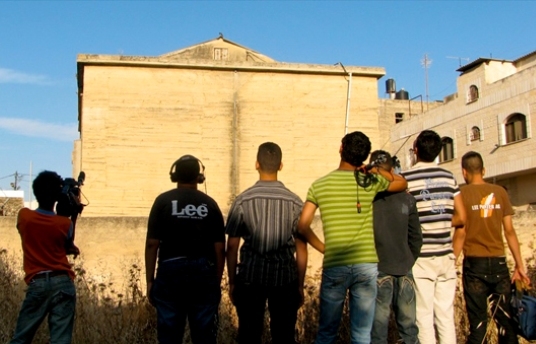A Trip to Jenin
Sep 05, 2010

Two nights after interviewing the director and lead actors of Besouro, a Brazilian action film about Capoeira, our camera crew and I left the hub of Berlinale to meet two men who are leading an effort to rebuild a cinema in the West Bank town of Jenin.
The event was planned as a fundraising event at Chamaleon, a movie theater in one of Berlin’s more trendy neighborhoods and brought the worlds of philanthropy and filmmaking together. As we arrived, we bumped into Julia Bacha, the director of Budrus, a film which follows a Palestinian who unites Fatah, Hamas and Israelis in an unarmed movement to save his village from destruction. Julia was one of many celebrated filmmakers and actors at the event.
Marcus Wetter, Filmmaker and Founder of Project Cinema Jenin and Project Manager Fakhri Hamad greeted a mixed, eclectic and generous crowd of supporters at Chameleon and spoke of the importance of rebuilding the cinema, which had been closed since the first intifada in 1987, depriving the 50,000 residents of Jenin of a cinema.
The project was launched after Ismael Khatib – born in 1965 in the Jenin refugee camp – lost his son Ahmed when an Israeli soldier mistook the boy’s toy riffle for a real one and killed him. Ismael’s decision to donate his son’s organs to Arab and Jewish patients, received a lot of media attention and was eventually documented in Marcus’s film, “Heart from Jenin”.
When they wanted to show the film in Jenin, they realized there was no venue. So, Project Cinema Jenin was born.
Since Israel’s December 2008 invasion of Gaza, which left the small strip of land devastated, stories from inside Gaza were scarce – even as millions sat glued to their television screens hungry for stories to permeate through the blockaded borders.
In trying to silence stories from leaving Gaza by refusing to allow journalists to enter in the lead up to the war, Israel provoked the world’s curiosity for stories, giving filmmakers a platform to contextualize their predicament and share gripping narratives with the world on the silver screen.
Now, if Marcus and Fakhri succeed, filmmakers will have a new venue in Palestine to show their films.
Aside from Cinema Jenin e.V., a non-profit organization based in Germany consisting of filmmakers, cultural advocates and investors dedicated to globally promote cinema culture, sustainable development and cultural understanding, the two men rely on dozens of volunteers in Germany who have been traveling (without pay) to Jenin to lend a hand.
Despite a lack of funding, resources and restrictions on movement, Palestinian directors have attracted renewed attention to Palestinian cinema and it can be said have began building the beginnings of a budding film community in the Palestinian territories.
While the recent slew of Palestinian films to hit the festival circuits (such as The Time That Remains, Pomegranates and Myrrh, Amreeka, and Ajami) is a promising sign for cinema in Palestine, for the 2.5 million Palestinians living in the West Bank, there is only one movie theater, Ramallah’s “Al Kasaba” theater, operating in the West Bank. Gaza has none.
Still, lacking glitz and glamor, but filled with grit, Gaza’s first ever film festival was launched in December 2009. Unlike other film festivals that fly in film strips and materials in order to hold the event, festival organizers in Gaza used the underground tunnels linking Gaza to Egypt to smuggle materials in.
Elias Suleiman, arguably the most renowned Palestinian filmmaker, sees filmmaking as a form of resistance.“Resistance isn’t what it was in the 1960s,” Suleiman recently said in an interview. “If we are just going to use the term for a nationalist cause, then I think we’re just [resurrecting] ’60s clichés.”
And Marcus and Fakhri see building a theater as a form of peace-building.At the event, chairs in the cinema that is currently being built in Jenin were auctioned off and the team raised thousands of Euros which will go towards the construction and running of the cinema.